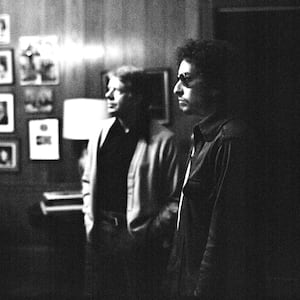VENICE—If two hours of shaky footage of a sex-starved 34-year-old Dennis Hopper eating, drinking, and smoking as 55-year-old Orson Welles grills him about everything from communist Catholics to the difference between sex and love or magic and miracles sounds like a great movie, then Hopper/Welles, which debuted at the scaled-down Venice Film Festival on Tuesday, is for you. For everyone else, it borders on painful.
The footage comes from a 1970 archive of a dinner party in L.A.—after Hopper flew in from New Mexico, where he lived in what sounded an awful lot like a hippy commune. It was meant for Welles’ final film The Other Side of the Wind in which an old director invited a young director over to talk about filmmaking. In Welles’ script, the power has gone off, so the scene is set with hurricane lamps and a fireplace for light. At the time, Hopper was in the final editing stages of The Last Movie. Neither films lived up to their dreams of that night.
The conversation starts strong, with talk of God and destiny, as Hopper eats spaghetti off a plate on his lap amid a table of wavy-haired women and a couple of men. Throughout the two-hour film, young women mark the time with clappers in the middle of the conversation, which never stops. Bells toll every 15 minutes from what might have been a grandfather clock, though it is never seen.
The whole movie is shot in one scene and Hopper strokes his beard obsessively, easily smokes through a pack of cigarettes, and downs several G&Ts. In one passage, Hopper quotes Bob Dylan; Welles asks, quite believably, who that is, to which Hopper replies, “just a singer.” Welles also goes off on left-wing revolutionary types which forces Hopper to defend his more liberal stance.
Two things are apparent right away: that Welles is far better read, constantly correcting Hopper’s stabs at historic ironies, and that Hopper is obsessed with sex, admitting he had a bad relationship with his own mother because he was sexually attracted to her. He admitted he spent his life falling in love with women who reminded him of his mother, with disastrous results.
Women are draped over chairs and laugh at things Hopper says that aren’t particularly funny, though Welles is off-camera and only seen in hazy silhouette from time to time. The conversation was of that era, when Hopper could get by with saying things like that he got into film direction “to meet ladies.” No matter what Welles asks, Hopper easily steers the conversation back to sex, at one point sharing his view that sex was fun but love was painful, which Welles scolded him was simply not true.
Hopper comes off as someone who cannot commit to an opinion which Welles homes in on time and again, telling him he’s not answering the questions, which makes Hopper giggle and wriggle in his chair. He says he wants to change the world through his films, but swears he’s not political. The contradictions and Welles’ reacting to them are charming at times.
There were clearly other cameras trained on Hopper for this somewhat bizarre interview, but the one that is primarily used is the handheld one Welles has from the other side of the low table, which makes it sometimes hard to focus on. And at two hours, the film feels far too long and meandering. But the superfans will surely disagree.


